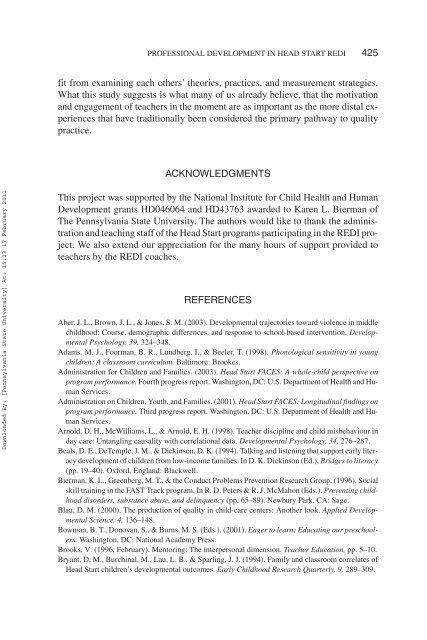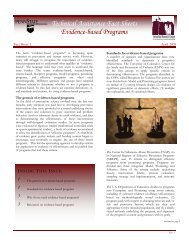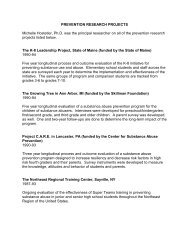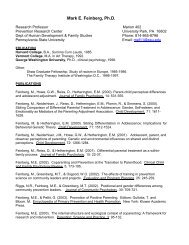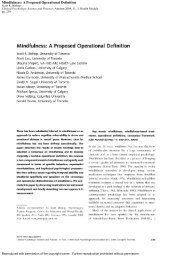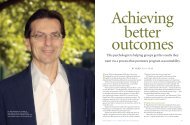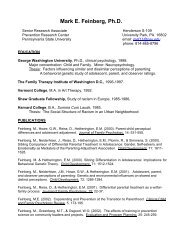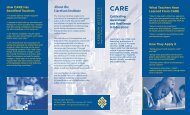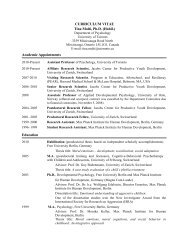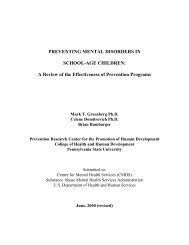Early Education & Development Individual Factors Associated With ...
Early Education & Development Individual Factors Associated With ...
Early Education & Development Individual Factors Associated With ...
You also want an ePaper? Increase the reach of your titles
YUMPU automatically turns print PDFs into web optimized ePapers that Google loves.
PROFESSIONAL DEVELOPMENT IN HEAD START REDI 425<br />
fit from examining each others’ theories, practices, and measurement strategies.<br />
What this study suggests is what many of us already believe, that the motivation<br />
and engagement of teachers in the moment are as important as the more distal experiences<br />
that have traditionally been considered the primary pathway to quality<br />
practice.<br />
ACKNOWLEDGMENTS<br />
Downloaded By: [Pennsylvania State University] At: 15:23 17 February 2011<br />
This project was supported by the National Institute for Child Health and Human<br />
<strong>Development</strong> grants HD046064 and HD43763 awarded to Karen L. Bierman of<br />
The Pennsylvania State University. The authors would like to thank the administration<br />
and teaching staff of the Head Start programs participating in the REDI project.<br />
We also extend our appreciation for the many hours of support provided to<br />
teachers by the REDI coaches.<br />
REFERENCES<br />
Aber, J. L., Brown, J. L., & Jones, S. M. (2003). <strong>Development</strong>al trajectories toward violence in middle<br />
childhood: Course, demographic differences, and response to school-based intervention. <strong>Development</strong>al<br />
Psychology, 39, 324–348.<br />
Adams, M. J., Foorman, B. R., Lundberg, I., & Beeler, T. (1998). Phonological sensitivity in young<br />
children: A classroom curriculum. Baltimore: Brookes.<br />
Administration for Children and Families. (2003). Head Start FACES: A whole-child perspective on<br />
program performance. Fourth progress report. Washington, DC: U.S. Department of Health and Human<br />
Services.<br />
Administration on Children, Youth, and Families. (2001). Head Start FACES: Longitudinal findings on<br />
program performance. Third progress report. Washington, DC: U.S. Department of Health and Human<br />
Services.<br />
Arnold, D. H., McWilliams, L., & Arnold, E. H. (1998). Teacher discipline and child misbehaviour in<br />
day care: Untangling causality with correlational data. <strong>Development</strong>al Psychology, 34, 276–287.<br />
Beals, D. E., DeTemple, J. M., & Dickinson, D. K. (1994). Talking and listening that support early literacy<br />
development of children from low-income families. In D. K. Dickinson (Ed.), Bridges to literacy<br />
(pp. 19–40). Oxford, England: Blackwell.<br />
Bierman, K. L., Greenberg, M. T., & the Conduct Problems Prevention Research Group. (1996). Social<br />
skill training in the FAST Track program. In R. D. Peters & R. J. McMahon (Eds.), Preventing childhood<br />
disorders, substance abuse, and delinquency (pp. 65–89). Newbury Park, CA: Sage.<br />
Blau, D. M. (2000). The production of quality in child-care centers: Another look. Applied <strong>Development</strong>al<br />
Science, 4, 136–148.<br />
Bowman, B. T., Donovan, S., & Burns, M. S. (Eds.). (2001). Eager to learn: Educating our preschoolers.<br />
Washington, DC: National Academy Press.<br />
Brooks, V. (1996, February). Mentoring: The interpersonal dimension. Teacher <strong>Education</strong>, pp. 5–10.<br />
Bryant, D. M., Burchinal, M., Lau, L. B., & Sparling, J. J. (1994). Family and classroom correlates of<br />
Head Start children’s developmental outcomes. <strong>Early</strong> Childhood Research Quarterly, 9, 289–309.


